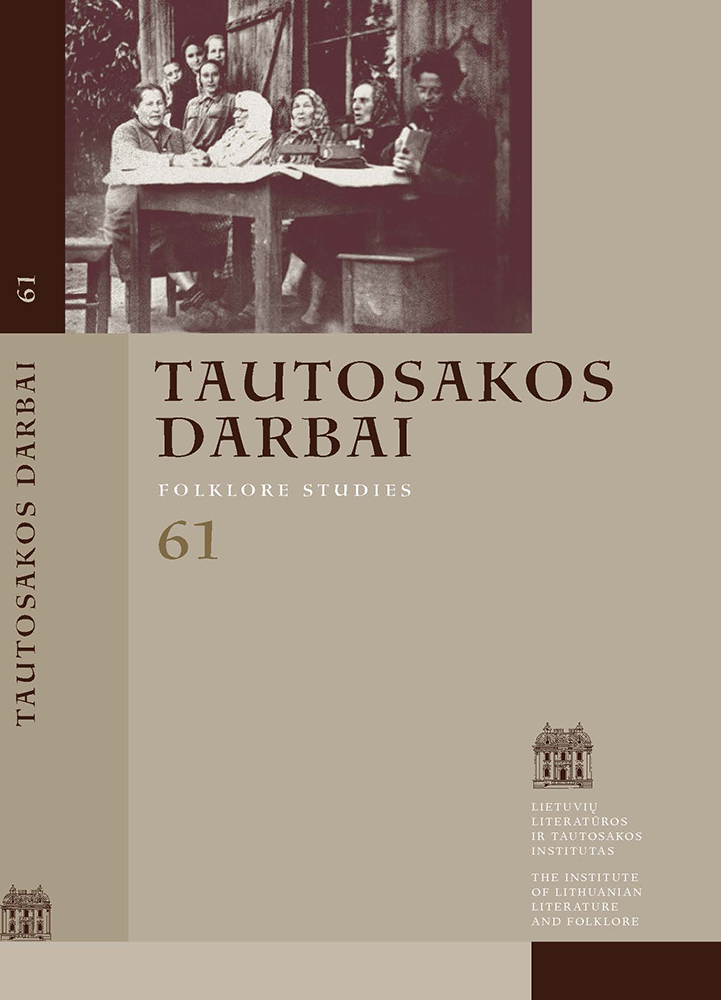Augustas Schleicheris – pirmasis lietuviškų pasakų skelbėjas
Santrauka
Straipsnyje analizuojama žymaus vokiečių kalbininko Augusto Schleicherio lituanistinė veikla. Mokslininkas pasižymėjo ne tik kaip lietuvių kalbos fiksuotojas, gramatikos autorius, bet ir kaip lietuvių folkloro užrašytojas ir skelbėjas. Išskirtinės vertės yra jo parengti Lietuvių kalbos skaitiniai ir žodynas (1857), kuriuose, be kitų folkloro žanrų, pirmą kartą publikuotos lietuviškos pasakos.
Straipsnyje analizuojama, kodėl, kokiomis aplinkybėmis A. Schleicheris užrašinėjo lietuviškas pasakas, koks jų žanrinis repertuaras, būdingi naratyvų bruožai. Kartu ieškoma atsakymo, kokia jo užrašytų pasakų reikšmė lietuvių folkloristikai.
A. Schleicherio laiškai, rašyti lituanistinės mokslinės kelionės į Rytų Prūsiją metu, parodė, su kokiais sunkumais jis susidūrė atvykęs į šį kraštą, kaip bendravo, ką patyrė ir kaip buvo renkamos lietuviškos pasakos. Mokslininkas pirmasis užrašė nemažai įvairių žanrų lietuviškų pasakų tipų pavyzdžių, kurių didesnė dalis yra būdingi lietuvių žodinės tradicijos pavyzdžiai. Nuveiktas tiek kalbotyros srities, tiek ir tautosakos užrašymo darbas parodė, kokia svarbi indoeuropeistikai yra lietuvių kalba, ir paskatino pačius lietuvius rinkti liaudišką žodinį paveldą. A. Schleicherį galima laikyti ir lietuviškų pasakų populiarintoju užsienyje. Jo dėka pirmosios lietuviškos pasakos buvo išverstos į vokiečių kalbą, publikuotos ir pastebėtos užsienio mokslininkų. Vėliau perleisti kūriniai pasiekė ir platesnius visuomenės sluoksnius.
Atsisiuntimai
Skaitomiausi šio autoriaus(ų) straipsniai
- Jūratė Šlekonytė, Pasakų sekėja XX–XXI a. sandūroje: subartoniškės Antaninos Čaplikienės atvejis , Tautosakos darbai: T 64 (2022)
- Jūratė Šlekonytė, Lietuvių stebuklinė pasaka „Sutartis nesiprausti“ (ATU 361): europinis kontekstas ir lokalieji ypatumai , Tautosakos darbai: T 66 (2023): Tautosakos darbai
- Jūratė Šlekonytė, Pasakų sekėjos moterys ir jų repertuaro ypatumai , Tautosakos darbai: T 67 (2024): Tautosakos darbai
- Jūratė Šlekonytė, Lietuvių pasakų tyrimų šimtmetis: nuo tradicinės komparatyvistikos iki šiuolaikinių metodų , Tautosakos darbai: T 49 (2015)
- Jūratė Šlekonytė, Nauja knyga apie stebuklinių pasakų simbolizmą , Tautosakos darbai: T 67 (2024): Tautosakos darbai
- Jūratė Šlekonytė, Lietuvių liaudies pasakos „Antimi pavirtusi sesuo“ populiarumo fenomenas , Tautosakos darbai: T 57 (2019)
- Jūratė Šlekonytė, Pirmieji fundamentinio čekų pasakų leidinio tomai , Tautosakos darbai: T 64 (2022)
- Vita Džekčioriūtė, Aušra Žičkienė, Jūratė Šlekonytė, Gražina Kadžytė, Jurgita Ūsaitytė, Lina Būgienė, Daiva Vyčinienė, Kronika , Tautosakos darbai: T 48 (2014)
- Jūratė Šlekonytė, Lietuvininkų sakmės apie laukinę medžioklę: vaizdinio kilmės klausimu , Tautosakos darbai: T 47 (2014)
- Jūratė Šlekonytė, Ar mums reikia pasakų? Atsakymą duoda Bruno Bettelheimas , Tautosakos darbai: T 55 (2018)
